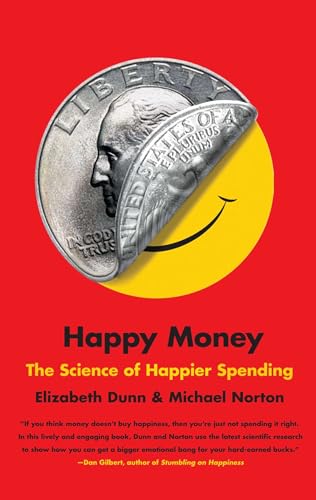money can buy happiness, if you spend it right.
I read this book in October 2023 when I was on holiday, so the ideas sounded great but I also I know that a lot of poor spending happens when we're feeling tired or rushed. A key lesson I took from this book was a reminder that scarcity can be beneficial. From Lent, to Ramadan, to Dry-January, reducing the 'good-stuff' to help us appreciate it more is an idea that resonates across times and societies.
Synopsis
Happy Money: The Science of Smarter Spending by Elizabeth Dunn and Michael Norton really challenges our conventional wisdom about money and happiness, offering a refreshing perspective. Think of it less as a guide to making more money, and more as a guide to getting more happiness from the money you already have.
The core idea is that while a certain amount of income is necessary for basic well-being, beyond that, simply accumulating more wealth doesn’t necessarily lead to greater happiness. Instead, it’s how you spend your money that truly matters. Dunn and Norton, drawing on a wealth of research from social psychology and behavioral economics, lay out five key principles that can help us optimize our spending for maximum joy.
One of the central principles is to “Buy Experiences,” arguing that investing in experiences—like travel, concerts, or a nice meal out—tends to bring more lasting happiness than buying material possessions. Experiences create memories, foster social connections, and become part of our personal story in a way that a new gadget often doesn’t. They also suggest making things a “Treat” rather than a constant indulgence, as scarcity can heighten appreciation.
Furthermore, the book delves into how “Buying Time” can significantly improve our well-being by freeing us from dreaded tasks, allowing us to pursue more enjoyable activities. And in a somewhat counterintuitive twist, “Pay Now, Consume Later” is another principle, suggesting that the anticipation of a future reward can actually enhance the pleasure we derive from it. Finally, and perhaps most profoundly, they emphasize “Invest in Others.” Research consistently shows that spending money on others, whether through gifts or charity, often leads to a greater boost in happiness for the giver than spending it on oneself. It’s a truly insightful and practical book that encourages us to rethink our financial habits in a way that genuinely enriches our lives.
Key Points
1. Buy experiences, not stuff.
2. Make it a treat.
3. Pay now, consume later.
4. Invest in others.
5. Buy time.

